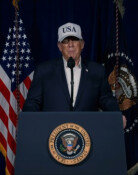Debate over Newspaper Act Rekindled by WAN Meeting
Debate over Newspaper Act Rekindled by WAN Meeting
Posted June. 03, 2005 06:55,
Article 16 of the Newspaper Act mandates the disclosure of materials relating to the management of newspaper companies, including their total circulation, the number of issues, subscription, advertising rates, and financial statements. Moreover, the companies have to report them annually to the Newspaper Development Committee. This measure, however, is under criticism now because it is seen as the governments unfair attempt to control the secret matters of private companies. Experts point out, This action can be seen as the governments scheme for violating private companies right to free enterprise and putting newspaper companies under its control, like it has with other public enterprises.
In addition, limiting the market share of newspaper companies, which generated serious debate at a meeting of the World Association of Newspapers (WAN), is also problematic when it is judged from the legal perspective.
According to the article regarding limitations on market share, when one newspaper company dominates over 30 percent of the market share or the market share of three companies total more than 60 percent, these companies are categorized as Significant Market Powers (SMP) and become subject to a fine amounting to the three percent of their total revenue when they are seen to abuse their power in market. They are also excluded from funds that are made available by the Newspaper Development Committee.
Activist groups in the field of journalism view this action as unproblematic because the article doesnt directly limit the number of issues circulated by companies that are designated as an SMP. However, companies refute this by saying that the action in effect results in limiting the number of issues because in order not to exceed the prescribed level of market share, companies have to refrain from expanding circulation and promoting sales. In fact, there is no need for the government to control the market share by law unless companies attempt to manipulate the market by combining with one another.
Even the governments assertion that limiting market share will enhance the diversity of public opinion stems from the erroneous idea that only newspapers steer the direction of public opinion. According to a nationwide survey of 1200 individuals conducted by the Korea Press Foundation last year, designed to discover what media Koreans use the most in building their opinions, TV was in first place at 49.9 percent, followed by the Internet (14.5%) and newspapers (13.3%). Therefore, even if three major newspapers take 70 percent of the market share, their combined influence amounts to just 10 percent. Rather, broadcasting companies that take up about 70 percent of the market share are more likely to manipulate public opinion.
According to the Newspaper Act, individual newspaper companies have autonomy in building an editing committee. However, since its enforcement ordinance stipulates that only those companies that possess editing committees are eligible to receive newspaper development funds, the stipulation is almost mandatory. In specifying the means of setting up editing committees, the law also mandates an equal number of committee members from labor and management, which sparks the criticism that designating a fixed number is not congruent with the principle of autonomy ostensibly espoused in the act.
Jung-BoSuh suhchoi@donga.com




![[단독]폴란드, 韓 해군 최초 잠수함 ‘장보고함’ 무상 양도 안받기로](https://dimg.donga.com/c/138/175/90/1/wps/NEWS/IMAGE/2026/02/27/133437397.1.jpg)


